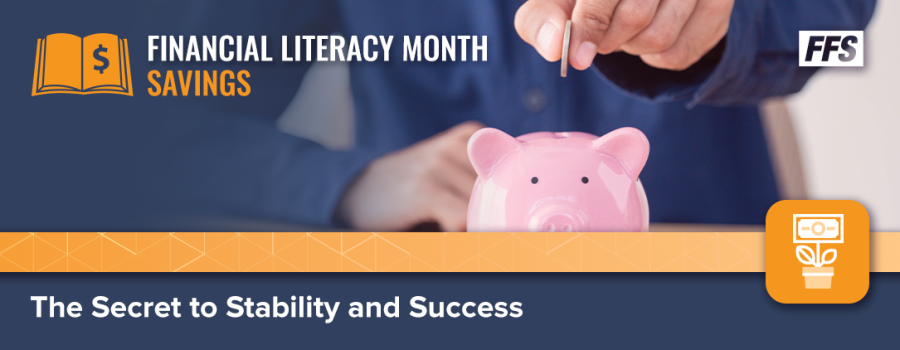April is Financial Literacy Month, a time to focus on building strong financial habits that set you up for long-term success. Week 2 is all about saving and how small steps today can lead to big wins tomorrow.
When people think of saving money, they often imagine it’s for far-off goals like retirement or buying a house. But the truth is, saving even the smallest amount of money is one of the most powerful actions you can do to gain control over your life, your stress, and your future.
Saving creates options. It gives you the freedom to handle unexpected expenses without going into debt, the confidence to walk away from a bad situation, and the opportunity to say “yes” to the life you want.
Think of your savings as the foundation of your financial house. Without it, even a small storm — like a car repair or medical bill — can cause serious damage. With it, you can weather any challenge and plan for what comes next.
Saving even the smallest amount of money is one of the most powerful actions you can do to gain control over your life.
3 Types of Savings Everyone Needs
You don’t need to save everything all at once. In fact, breaking your savings into clear goals can make the process more manageable and motivating. Here are the three types of savings you’ll need:
- Emergency Fund: This is your safety net. Aim to save 3 to 6 months of living expenses in a separate, easily accessible account. This fund is for true emergencies: job loss, unexpected medical bills, damage to your home, or car repairs.
- Short-Term Savings: These are savings for goals you want to reach within the next 1 to 3 years. These are things like vacations, weddings, moving expenses, or other big-ticket items. A high-yield savings account can be a great place to park this money while it grows a little over time.
- Long-Term Savings: This is where retirement planning, college savings, or a future down payment come in. These goals are usually 5 years out or more and may benefit from being invested for growth over time.
How to Start Saving Now
- Pay Yourself First: Treat your savings like a bill. Set up automatic transfers into your savings account on payday so it’s not an afterthought.
- Start Small: Even $10 or $20 a week adds up. The key is consistency.
- Cut Back: Instead of eliminating things you enjoy, try scaling back. Small changes in spending can create room for saving.
- Use Windfalls Wisely: Tax refunds, bonuses, and gifts can give your savings a quick boost if you resist the urge to spend it all.
Treat your savings like a bill. Set up automatic transfers into your savings account on payday so it’s not an afterthought.
Saving Is a Mindset
Saving money is all about creating the right habits and sticking with them. When you save, you’re telling yourself that your future is worth investing in. You’re valuing your peace of mind over impulse and building a life of lasting security and happiness.
This Financial Literacy Month, commit to starting or strengthening your savings. Whether it’s an emergency fund, a dream vacation, or retirement planning, every dollar saved is a step toward stability and success.
—
Learn more about savings and other Financial Literacy Month topics at Real Secrets of Money. Visit our blog for more insights and connect with a financial literacy teacher to start your journey to financial well-being today.




